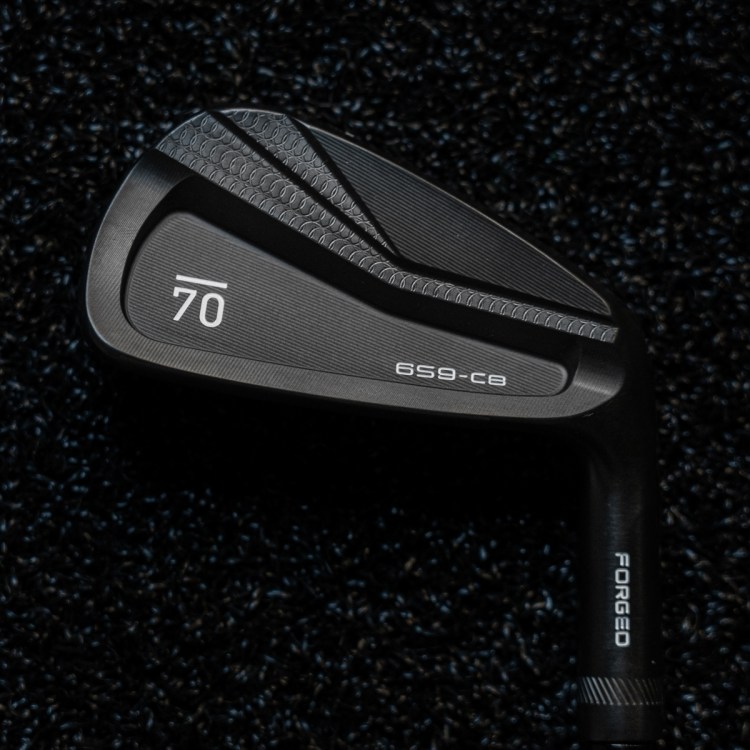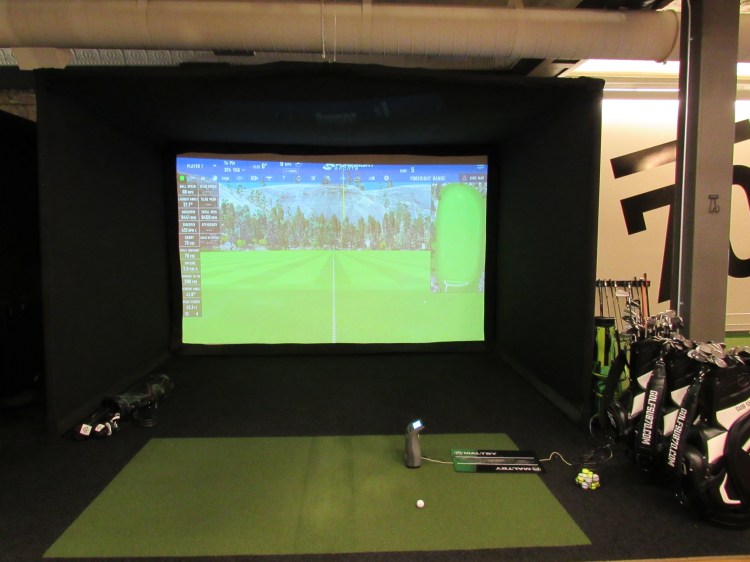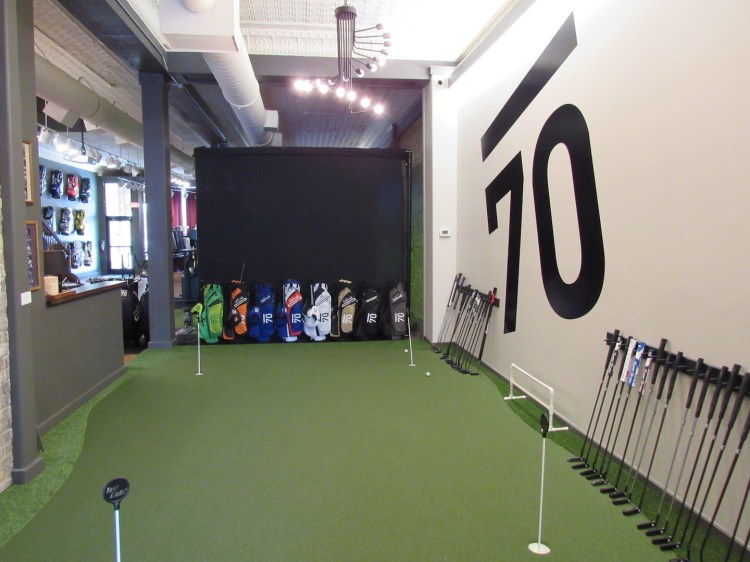In 1835, Carlos Lattin built the first log cabin in the town that came to be known as Sycamore, Illinois. Today, on that same site, is the fitting center of Sub70 Golf, one of the fastest-growing direct-to-consumer boutique golf club companies since 2018. The recipe for this success is a combination of the highest quality equipment at prices about 40% less than the big-name clubmakers, seasoned with the best customer service in the business.

I spent the morning recently with Jay Armour, Sub70’s Director of Marketing, and Kevin Healy, PGA Professional and Director of Fitting and Instruction, at Sub70’s sparkling new fitting center HQ in downtown Sycamore (about 65 miles west of the Chicago lakeshore). The space is large and attractive, with a mix of original hardwood floors and exposed brick along with state-of-the-art simulator bays, comfy furniture, flat-screen TVs, putting area, jukebox, Golden Tee game, selection of the company’s new apparel line, and a bar.

Sub70 CEO Jason Hiland had been in the golf business for nearly 30 years, having founded the companies Diamond Tour Golf and Hurricane Golf. The former is a seller mainly of club components, and the latter an online golf equipment retailer. Eventually, Hiland grew tired of selling other companies’ equipment and wanted to offer something of his own. He landed upon the idea of direct-to-consumer sales, while also keeping prices low, by dispensing with the advertising budget and eschewing paid player endorsements. Hiland had all the industry contacts – shafts, grips, clubhead fabrication plants, etc., etc. So work began on designing the best possible forged irons and, eventually, hybrids, woods, and putters, that can be customized for every single buyer.


“We have an incredible reputation for customer service,” says Armour, “and being transparent and open.” Most direct-to-consumer club manufacturers don’t allow returns. “Or you can only hit one of your clubs,” explains Healy, “and then you only have two weeks to return them, based on that one club.”
In contrast, Sub70 has a firm 60-day, no-questions-asked policy on returns. But this good-old Midwestern trustworthiness doesn’t start with the sale. It is the very foundation of the entire process. Every single set of Sub70 clubs is custom-made, by hand, according to each individual customer’s specs. How do they get these specs? Well, several different ways.

The most obvious of these is, sitting in the Sub70 fitting center, an in-house fitting by Healy or another Sub70 fitter. “We have visitors from all over the country,” says Armour. “Lots of them are in Chicago for business or vacation, and they hop over here for a fitting. We do about 50 fittings a week here, by appointment.”

So, they must rake in dough on those fittings, right? “Nope. All fittings are free. And if Kevin looks at your numbers with your clubs and ours and there’s no difference, he’ll tell you. No obligation. No up-selling, no pressure to buy anything at all from us. It’s very casual.” (Hence the bar in the fitting center.)
The atypical nature of the fitting process doesn’t end there, though. Healy is a PGA Professional who’s been giving lessons at some of Chicagoland’s top courses and clubs for decades. Unlike every single fitting I’ve gone through, where the fitter doesn’t comment on your swing (or help you fix flaws), the Sub70 process may include a lesson, too. “If I see something, I say something,” admits Healy. “I don’t want to fit someone’s bad swing.”
If you aren’t able to get to Sycamore, you can contact Sub70 online or by phone with specs of your current clubs (if you’re happy with them) or with specs from a different fitter. “We figure it out with them from there, usually with some back and forth to make sure we get everything right,” explains Armour. “We have heads that are comparable to just about everything out there. And every shaft and grip you can think of.”

“And if something seems off,” interjects Healy, “we’ll ask. You see some strange things from some other fitters – things that don’t seem right. Specs are like medical notes. They can be read by any fitter, but sometimes a second opinion is helpful.”
Once the specs are all nailed down and the order is placed, turn-around is usually 7-10 business days.
Once customers have their new sticks, they have a year until the next “longer, straighter” clubs come out, right?
“Sub70 doesn’t have any product life cycles,” says Armour. “Unlike the big names, who put out ‘the next best thing’ every year – or even every six months – our clubs are built to perform for however long they still fit you.”

“And the USGA regulates all club performance tolerances anyway,” says Healy. “If you think that this year’s version of last year’s driver is going to give you 30 extra yards, you’re fooling yourself. Performance hasn’t changed much in the last 30 years – USGA doesn’t allow it. It’s all just tweaking here and there.”
So even though Sub70 is always innovating in various ways, there’s no timeline for the “next” line of clubs. “We’ll have a new driver coming out in 1.5 – 2 years,” says Armour. “And a couple new putter models. But our focus is on adding more fitting carts and training more independent fitters across the country [who do charge for fittings, as that’s their business], so more golfers can have access to our clubs. We don’t want to or need to come out with anything ‘new’ until we can confidently say we’ve made an improvement or that we’ve filled a gap in our offerings.”
Access is important, including cost-related access. For example, the Sub70 line of putters are all CNC milled from solid blocks, and come with customizable weight sets and headcovers for about $169. Compare this to other “boutique” putter makers whose flatsticks can range up to $800. The Sub70 849 Pro Driver runs just $279, earning it and all of Sub70’s offerings the “#1 Direct-To-Consumer Golf Brand Award” from MyGolfSpy.com.

The same philosophy applies to the new Sub70 apparel line. Polos run, for example, from $35-$50 each, compared to $80+ for logo wear at pro-shops. And the Sub70 logo (the numeral 70 with a line above it) is already pretty iconic.

Although Sub70 doesn’t pay players to use their clubs, many at the elite touring pro level do. “Zack Fischer plays our irons and wedges,” says Armour. “He just won the Argentine Open. And several guys on the PGA Champions Tour play them, but we can’t use their names since we don’t pay them for it.”
In short, Sub70 has clubs for players of all skill levels, “From 30-handicaps to Tour players.”

Sycamore, Illinois, might not be the first place that comes to mind when you think “boutique golf clubs,” but Sub70 is building a customer-centered golf empire on the very spot where Carlos Lattin built that first cabin. Who knows whether Carlos had ever even heard of golf, but he’d probably be impressed that an innovator like Sub70 is following in his trailblazing footsteps.

